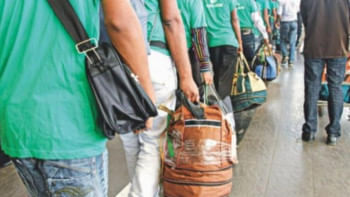Cases Under DSA: Almost all accused kept hanging

Only two percent of the people accused under the Digital Security Act saw their cases come to a close with the court handing either a conviction, an acquittal or the dismissal of the case.
This is according to the data collected by the Centre for Governance Studies (CGS), who logged each case filed between October 2018 and August 2022.

It recorded 1,109 cases filed under the DSA, of which around 60 percent were over Facebook activities.
A total of 2,889 individuals were accused.
Of them, only 52 saw their cases coming to a close within the court system, the data shows.
Around nine others found some relief only because their accusers withdrew the cases against them.
Meanwhile, the police are still investigating three quarters of the thousand or so cases, according to CGS's data.
At least 725 of these cases are from before 2022 -- meaning it's a clear violation of the legal time limit given to the law enforcers to complete investigations.
"The law stipulates that an investigation report must be submitted within 60 days. If necessary, the investigating officers can seek an extension of 15 days from the authorities. After 75 days, they will have nothing to do. It then falls under the jurisdiction of the tribunal," said Dr Ali Riaz, distinguished professor of political science at Illinois State University, USA, and lead author of this research.
He made the marks in a report titled "What's happening: trends and patterns of the use of the Digital Security Act 2018 in Bangladesh".
He added, "Over the past four years, we have seen that, in many cases, even if the investigation report is not given within the stipulated 75 days, the accused is still in custody and effectively being punished before trial."
The increase of cyber tribunals from one to eight, with one in each administrative division, has neither expedited trials nor helped the accused get bail quickly.
This has made matters even more alarming as over a thousand of those accused have faced arrest. This means one out of every three people facing prosecution under the DSA were being arrested, he said.
"The number, while significantly large, does not include all the cases filed nor all the people accused. This is because law enforcement agencies refuse to provide statistics regarding the cases and the accused," said the CGS report.
"The data from the cyber tribunal only reflects the cases which have reached their dockets and are in the process of being tried. As such, these numbers represent a small portion," it added.
The researchers learned of the professions of around half of those accused.
Politicians and journalists ranked the highest and were neck-to-neck in terms of those accused -- at least 287 politicians and 280 journalists.
According to the data, politicians -- ruling party affiliates to be more specific – were also the largest group of people prosecuting the journalists.
The cases were mostly on charges of defamation, the data shows.
However, the prosecutors were not direct victims in any of those cases, meaning they were filing those on behalf of someone else who was "hurt" by the alleged act of defamation.
Out of all the cases, as many as 140 were filed directly for allegedly defaming Prime Minister Sheikh Hasina, the report said, while 64 cases were filed for allegedly defaming ministers.
"Ruling party activists have filed 4.21 cases every month, and each had an average of 2.4 persons accused; or in simple words, every week a case has been filed by an Awami League activist against more than two persons for almost four years under one law," Riaz said in the report.
Even among the ruling party affiliates, Bangladesh Awami League and Bangladesh Chhatra League topped the list of accusers, filing 74 and 72 cases each respectively.
"In recent years, with growing access to the internet, social media, particularly the use of Facebook, has grown exponentially. It has also become an avenue for expressing discontent against social ills and government policies.
"It is in the context that the DSA has been used as an instrument to silence contrarian voices," concluded the report.
Launching the report, Zillur Rahman, executive director of CGS, told a webinar that the culture of fear that has pervaded the country for the last few years was only solidified by a law like the Digital Security Act.


 For all latest news, follow The Daily Star's Google News channel.
For all latest news, follow The Daily Star's Google News channel. 







Comments